DDoS attacks have been on the rise not only in numbers but also in sophistication, making them a top threat to any business or organization of all sizes. Such malicious attacks can overwhelm the network or website and make it unavailable to real users; which could lead to huge financial and reputational damage. Hence, it becomes important to enforce robust protection mechanisms against the growing threats of DDoS.
Herein, we walk you through the 13 best DDoS protection software in the market today. These solutions are equipped with advanced features and technologies to handle the prediction, mitigation, and prevention of DDoS attacks. Before we look through the list, how can application layer DDoS attacks be detected?
What is DDoS?
A Distributed Denial of Service attack is a malicious attempt that uproots the normal operating manner followed by the targeted server, service, or network, by bombarding it with excess internet traffic emanating from various sources.
This excess internet traffic utilizes all the spaces available within the targeted area, rendering it unable to respond to other requests and hence making the service unavailable to genuine users.
There are the following types of DDoS attacks:
- Volumetric attacks: These are those that swamp the victim with high traffic volume, which utilizes all free bandwidth available.
- Protocol attacks: These attacks exploit weaknesses in network protocols, thereby draining server resources.
- Application layer attacks: These are so named because they target specific applications or services. They “mirror” or “emulate” normal user behavior in application-layer DDoS attacks so security controls used will not tag it as an attack traffic.
How DDoS Protection Software Works
A DDoS protection software works through a multilayer set of mechanisms for the detection, mitigation, and prevention of DDoS attacks. Here is a breakout of how most of these systems work:
1. Traffic monitoring and analysis
The first line of DDoS defense involves the continuous monitoring of incoming network traffic. Compound algorithms inspect traffic patterns for irregularities, potentially indicative of an attack, including:
- Parsing packet headers and payload data
- Observing traffic volume and rate
- Analysis of source IP address and geolocation data
- Identification of abnormal traffic patterns or spikes
2. Detection of Attack
If a detected anomaly, the software uses the following to determine whether it is a real DDoS attack:
- Signature-based detection compares the pattern of traffic against the already-known pattern of a DDoS attack.
- Behavioral analysis identifies different traffic that does not meet the preset baselines.
- Machine learning algorithms learn new vectors of attack and threats that are evolving.
- Detecting events of interest by the application of rule-based systems.
After the attack is confirmed, the protection software initiates filtering and scrubbing of the traffic:
3. Traffic Filtering and Scrubbing
- Blacklisting: Blocking the traffic from known sources of the malicious IP addresses
- Whitelisting Blocking the network such that it would only accept traffic to or from known trusted sources
- Rate limiting: Restriction applied on the number of requests per second from a single source
- Protocol validation: Noncompliant traffic is filtered, that does not follow the proper network protocols in use
- Deep packet inspection: the inspection of packet content to identify and block malicious payloads
4. Traffic Rerouting
Most DDoS protection solutions will implement some approach to traffic rerouting. These include the following:
- Anycast network: the sending of traffic to many data centers worldwide; this spreads the traffic volume to take on the size of an attack
- Scrubbing centers: rerouting suspicious traffic and cleaning it in centers established especially for this, and then finally forwarding it to the source server
5. Real-time Mitigation
The DDoS Protection Software changes its mitigation tactics in real-time as the attack progresses.
- Dynamic rule creation: generate new rules for filtering about the characteristics of the attack
- Adaptive thresholds: modifies the traffic limits based on the current network conditions
- Challenge-response: Trigger CAPTCHAs or JavaScript challenges for bot traffic filtering
6. Load Balancing and Scaling
In the event of an attack
- Distribute the traffic across numerous servers to avoid congestion
- Automatically adjust the resources to cater to the volume of traffic
7. Reporting and Analytics
A great DDoS protection software has to generate the smallest detail in attacks. This encompasses a real-time attack visualization and delivers in-detail logs and reports for the attacks that occur. It should also provide a post-attack analysis to allow organizations to be on guard beforehand.
Key Features in a DDoS Protection Software
Features to check in a DDoS attack protection solution include:
1. Multi-Layer Protection: Volumetric, Protocol, and Application Layer Protection.
2. Global Network: For its extended global network of scrubbing centers and points of presence (PoPs); it needs to distribute and mitigate traffic efficiently.
3. Machine Learning: Powerful AI and machine learning algorithms enhance detection accuracy and evolve with new attack vectors.
4. Custom Policies: The rules of protection should be customized by your application and infrastructure requirements.
5. Real-time Monitoring and Alerts: Immediate notifications with detailed attack analytics allow fast response and planning.
6. API Integration: Easy integration to any safety infrastructure and tools for simplified operations.
7. Scalability: The solution should be able to take varying traffic volumes and adapt to your growing business needs.
13 Best DDoS Protection Software
1. AppTrana DDoS Mitigation
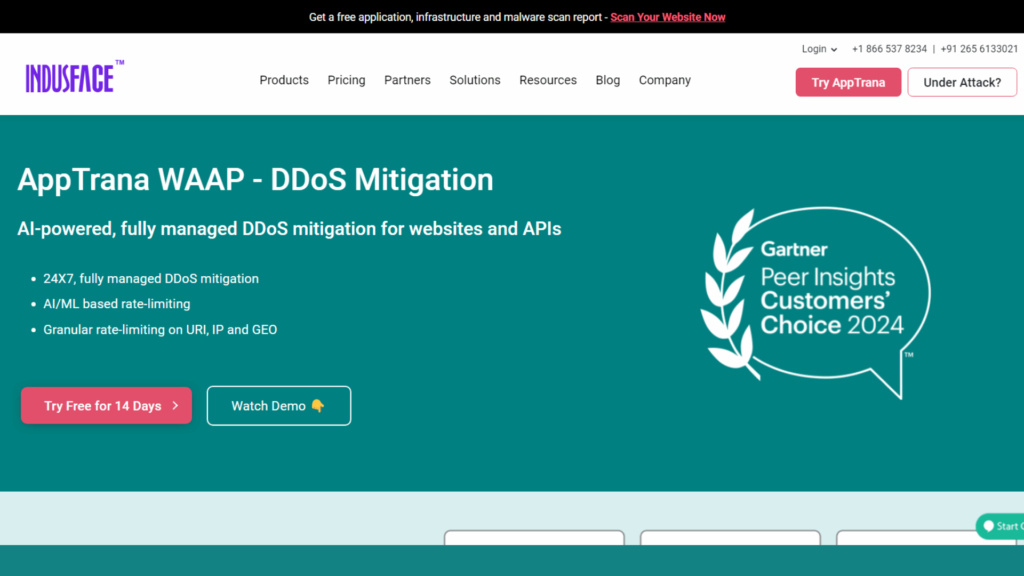
AppTrana DDoS Protection Software uses machine learning and human expertise to blend and offer protection against various types of DDoS attacks. It analyzes real-time traffic for automatic mitigation, serving to sustain the least downtime for your services.
AppTrana is built on a cloud-based infrastructure that is highly scalable and always ready to meet your dynamic requirements. It also gives you deep attack analytics and reporting. From such analytics, you can better understand attack patterns and improve your overall security posture.
AppTrana, which has an excellent user-friendly interface and rules that can be easily customized, makes it easy for any business, regardless of its size, to easily implement the best DDoS Protection Software measures.
Key Features:
- Machine Learning-based Threat Detection
- Real-time Traffic Analysis with Auto Mitigation
- Customizable Protection Rules
- Detailed Attack Analytics and Reporting
- Easy to implement and use
- Scalable Cloud-based infrastructure
- Automated protection combined with human expertise
Website: https://www.indusface.com/ddos-protection.php
Suggested Read: Top 10 AI Tools for Cybersecurity
2. The Cloudflare DDoS Protection Solution
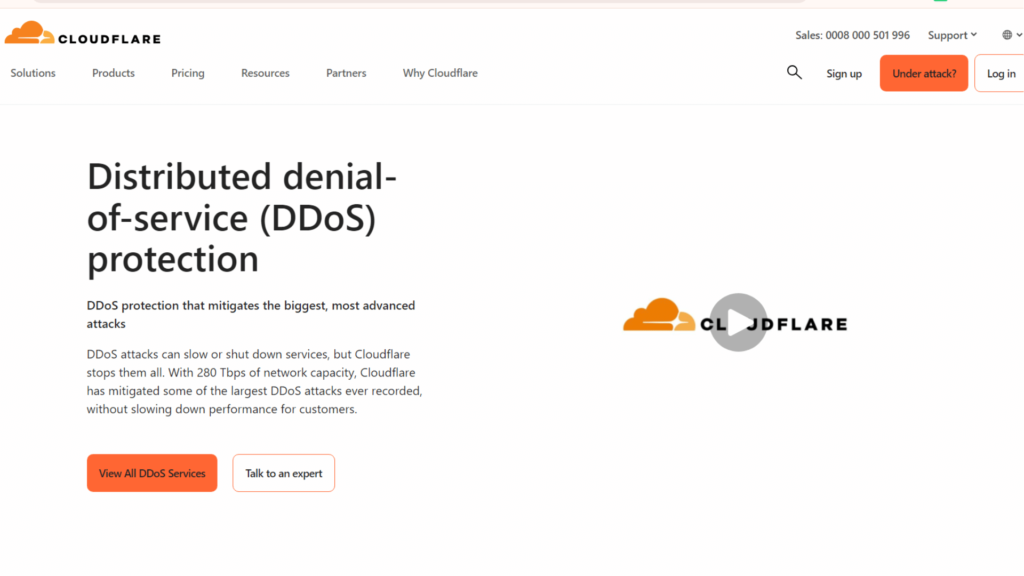
The Cloudflare DDoS Protection Software leverages the massive global network to absorb and mitigate attacks of any magnitude at any time. It provides unmetered DDoS mitigation, meaning your services are secured even during the biggest attacks.
Its offering runs advanced machine-learning algorithms, detecting and blocking network and application-layer attacks in real-time. It fully integrates with the Cloudflare security suite natively, providing complete protection and privacy for your infrastructure from a large number of different types and forms of attacks.
Key Features:
- DDoS mitigation capabilities that work on an unlimited level
- Protection at the network and application layer
- Deep integration with other Cloudflare security services
- Real-time threat intelligence
- Huge network capacity to mitigate large attacks
- Easy integration with pre-existing infrastructures
- Strong security suite
Website: https://www.cloudflare.com/ddos/
3. Akamai Prolexic

Akamai Prolexic is a globally distributed site with cloud-based DDoS Protection Software; it enables total protection from colossal-scaled, advanced DDoS attacks. It scrubs and absorbs malicious traffic before it reaches your infrastructure.
Prolexic constantly monitors and mitigates 24/7, with seasoned DDoS experts, to make sure it will respond as quickly as possible to emerging threats. Its protection strategies are all customized and customizable to the customer’s needs and their profile of risk.
Through Akamai Prolexic, real-time visibility into attack traffic and mitigation can be realized with portal and API integrations.
Key Features:
- 24/7 Expert Monitoring and Mitigation
- Protection Strategies Customizable
- Defense Against Multi-Vector Attacks
- Real-Time Attack Visibility and Reporting
- Highly scalable global network
- Experienced DDoS mitigation team
- Defense against most types of attacks
Website: https://www.akamai.com/resources/product-brief/prolexic
4. Imperva DDoS Protection

Imperva DDoS Protection Software provides volumetric DDoS, protocol, and application layer protection in a multi-layer defense against attacks. Its solution fuses cloud-based mitigation and on-premises hardware to provide very effective protection of edge and origin infrastructures.
Imperva’s solution quickly identifies and mitigates new and evolving threats with the help of powerful behavioral analysis and machine learning-based algorithms. This service, on the other hand, ensures that it fully takes care of your assets where protection is concerned, 24/7, without introducing latency in peacetime.
Imperva gives detailed analytics with forensics on the attacks, which will provide insight into the nature of attacks, which you can learn from, to enhance your security stance.
Key Features:
- Multilayered protection for cloud as well as on-premises devices
- Behavioral analysis and machine learning
- Always-on protection with the least latency
- Detailed attack analytics and forensics
- Offers comprehensive coverage for protection of both edge and origin.
- Deployed through on-premise infrastructure and as a service in the customer cloud
- Advanced analytics and reporting
Website: https://www.imperva.com/products/ddos-protection-services/
5. Radware DDoS Protection

The Radware DDoS Protection Software is an amalgamation of behavioral-based detection algorithms and the real-time creation of signatures. This hybrid is used to create protection from both known and zero-day attacks.
Deployment is both on-premises and in the cloud and allows every organization to choose the best option that fits their needs. The patented behavioral algorithms by the Radware solution are designed to identify and mitigate an attack with quick reflexes.
At the same time, it keeps false positives low so that legitimate traffic is not blocked.
Key Features:
- Behavioral-based detection algorithms
- Real-time signature creation
- Flexible deployment options (on-premises and cloud)
- 24/7 support from the Emergency Response Team
- Useful against known and zero-day attacks
- A relatively low rate of false positives
- Protection against advanced multi-vector attacks
Website: https://www.radware.com/products/defensepro/
6. Arbor Cloud DDoS Protection
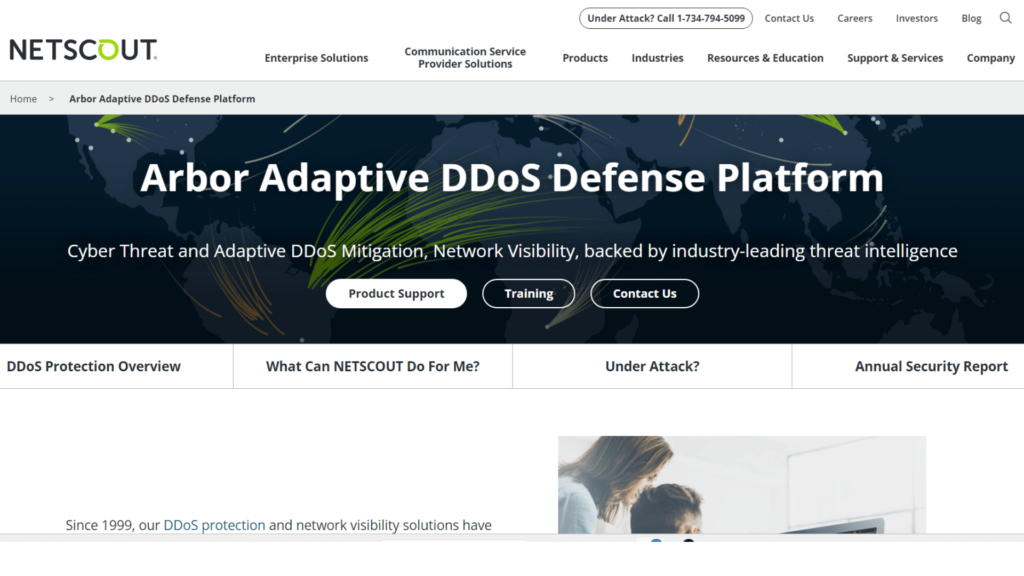
With Arbor Cloud DDoS Protection Software, the in-house protection is further strengthened through cloud-based mitigation, providing an all-encompassing defense that becomes better when combined with other forms of security against large-volume attacks.
Arbor filters and scrubs malicious and illegitimate traffic using its global network of scrubbing centers before it reaches the organization’s infrastructure.
Its portal traces back attacks in near real-time; moreover, it provides visibility on attacks and the reporting necessary for monitoring threats and mitigating them.
Key Features:
- Hybrid protection, which is both on-premises and cloud
- Intelligent traffic steering
- Real-time attack visibility and reporting
- Access to expert security team—ASERT
- Two seamless integrations—on-premises and cloud protection
- Effective against large-scale volumetric attacks
- Comprehensive threat intelligence
Website: https://www.netscout.com/arbor-ddos
7. FortiDDoS

FortiDDoS is a purpose-built DDoS attack mitigation appliance that enables real-time protection from known and zero-day attacks. It combines behavioral analysis, machine learning, as well as threat intelligence to deliver an enhanced and expedited content filtering mechanism in both detection and mitigation phases.
It ensures that it will have line rate performance such that no legitimate traffic will be affected during the time of mitigation. The solution also has protection from volumetric, protocol, and application-layer attacks.
FortiDDoS also integrates with other Fortinet security products to have a unified approach to security.
Key Features:
- Behavioral Analysis and Machine Learning at Line-Rate
- Performance Extensive Coverage of Attack Types
- Fortinet Security Fabric Integration
- High-performance on-premises protection
- Effective against known and zero-day attacks
- Seamlessly integrates with other Fortinet products
Website: https://www.fortinet.com/products/ddos/fortiddos
8. Fastly DDoS Protection & Mitigation

Fastly DDoS Protection Software is a service that offers customers robust DDoS attack defense powered by their global edge cloud platform. This gives protection all the time, and in a latency-avoidant manner at peacetime.
Fastly’s approach, powered with real-time anomaly detection and machine learning algorithms, identifies malicious traffic quickly and blocks it. This service enables full coverage from all types of network and application layer attacks.
Fastly offers sophisticated attack analytics and attack reporting with its real-time logging and streaming to gain insights into threats in progress.
Key Features:
- Always on protection with the least latency
- Real-time anomaly detection
- Network and application layer protection
- Deep attack analytics and logging
- High-performance edge cloud platform
- Negligible effects on legitimate traffic
- Comprehensive reporting capabilities
Website: https://www.fastly.com/products/ddos-mitigation
9. AWS Shield
AWS Shield is a DDoS protection service from Amazon Web Services that is designed to ensure application safety while running on AWS. The service consists of two tiers: Standard and Advanced.
AWS Shield Standard is automatically provided free of charge to all AWS customers upon signing up for the service and protects against most of the common and frequent network and transport layer DDoS attacks.
Shield Advanced provides DDoS protection beyond the standard tier through real-time attack visibility, access to 24/7 AWS DDoS response, and cost protection when scaling during attacks.
Key Features:
- Native integration with AWS services
- Two-tier protection (Standard and Advanced)
- Real-time attack visibility – Advanced
- Cost protection during attacks – Advanced
- Native integration with AWS infrastructure
- Scalable protection for increasing workloads
- Access to AWS DDoS response team – Advanced
Website – https://aws.amazon.com/shield/
10. Azure DDoS Protection

DDoS Protection in Azure is a cloud-based service provided by Microsoft for safeguarding Azure resources from all kinds of DDoS attacks. It comes in two versions: Basic, free for all using Azure, and Standard.
Azure DDoS Protection Basic is a service that continuously monitors traffic by default and provides protection from common network-layer attacks through automatic mitigation. The Standard tier offers more advanced mitigation capabilities, real-time attack analytics and insights, and post-attack reports.
Azure DDoS Protection studies integrate well with other Azure services to provide a consistent security posture across cloud resources.
Key Features:
- Two-tiered protection: Basic and Standard
- Automatic tuning of mitigation policies
- Real-time attack metrics and alerts. Standard
- Integration with Azure Monitor
- Native integration with the Azure services
- Adaptive defense based on traffic application patterns
- Rich Telemetry and Reporting
Website: https://azure.microsoft.com/en-us/services/ddos-protection/
11. F5 Silverline
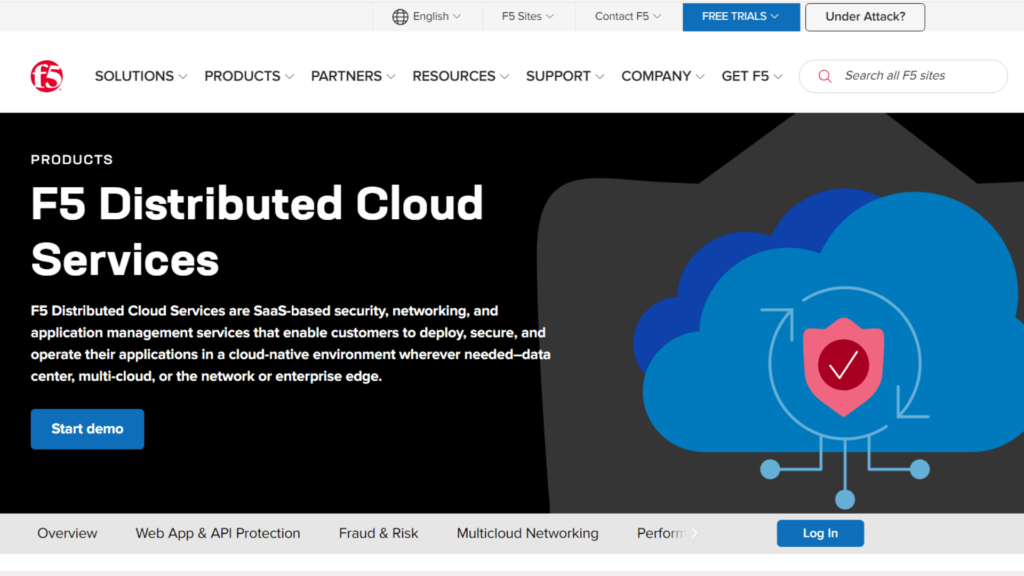
F5 Silverline is a cloud-based security platform with greater and more robust DDoS protection features embedded. It leverages the F5 global network of scrubbing centers, that identifies and filters attacks before they ever hit your infrastructure.
With options for always-on and on-demand protection, Silverline is designed for adaptability to fit within an organization’s requirements.
This is achieved through a system that combines signature-based detection, behavioral analysis, and machine learning to ensure the detection and blocking of known and emerging threats.
Key Features:
- On-demand and always-on protection options
- Multi-layered threat detection
- Support from the Security Operations Center is around the clock
- Comprehensive reporting and analytics
- Flexible deployment and service option
- Integration with other F5 in-country security services
- Access to in-country expert security team
Website: https://www.f5.com/products/security/silverline
12. Check Point DDoS Protector
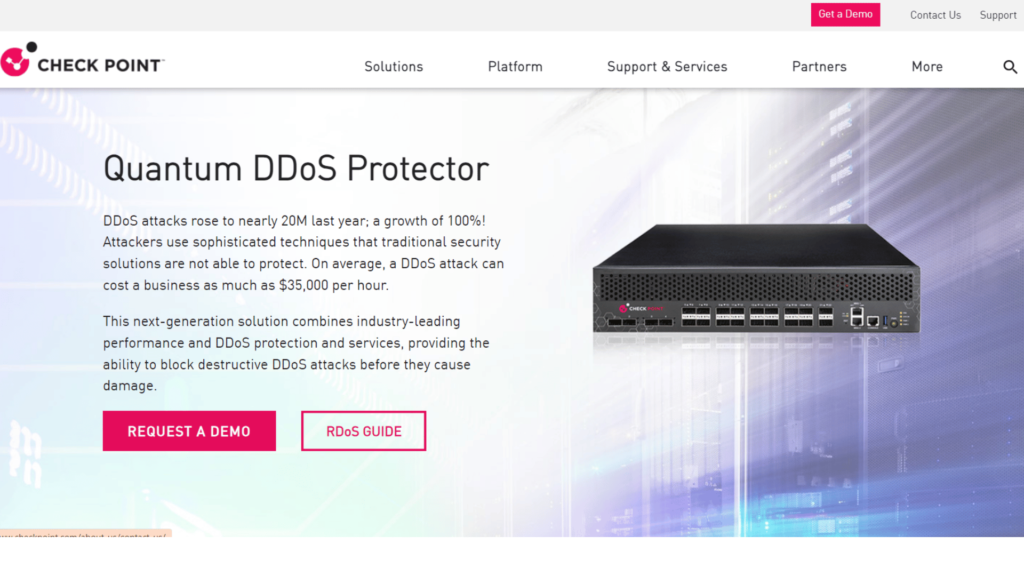
Check Point DDoS Protector is on-premise appliances that provide real-time DDoS attack protection. This solution blocks network and application layer attacks with a multi-layered approach. Signature-based detection is applied besides behavioral analysis and challenge-response mechanisms to rapidly detect any malicious traffic.
This guarantees line-rate performance, which ensures that legitimate traffic is not impeded to its far-off destination by the DDoS Protector mitigation of an illegitimate packet. The DDoS Protector is aligned with other Check Point security solutions, giving the customer an integrated approach to protection.
Key Features:
- Multi-layered protection approach
- Line-rate performance
- Part of the Check Point security ecosystem
- Attack analytics and detailed reporting
- High-performance on-premises protection
- Seamless integration with other Check Point products
- Comprehensive threat detection capabilities
Website: https://www.checkpoint.com/quantum/ddos-protector/
13. Google Cloud Armor
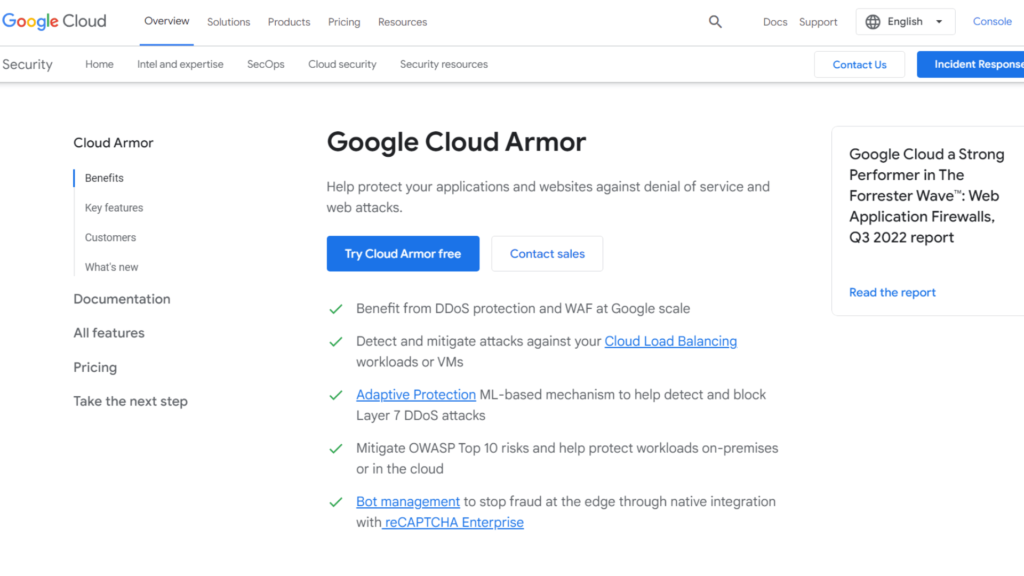
Google Cloud Armor is a cloud-native security service for protecting applications running on the Google Cloud Platform from Distributed Denial of Service and web-based attacks. It allows leveraging Google’s global network and threat intelligence to detect and group attacks at a fast pace.
Cloud Armor is pre-defined with basic rules to protect known vulnerabilities, and custom rule-making is enabled for party-specific security requirements. This service protects against network and application layer attacks, thus entirely covering all bases of protection.
Key Features:
- Pre-built and Custom Security Rules
- Network and Application Layer Protection
- Native Integration with Google Cloud Services
- Ease of logging and additional monitoring capabilities
- Natively integrated into the Google Cloud Platform
- Employs the worldwide network of Google along with threat intelligence
- Uses DDoS protection with WAF
Website: https://cloud.google.com/armor
Conclusion
But, in the final view, there are 13 best DDoS protection software products with different features and capacities to avert these different styles of DDoS attacks. The following are the parameters to be considered while choosing an apt solution for any organization: infrastructure setup, specific security requirements, budgetary constraints, and required support capabilities.
A good distributed denial-of-service protection plan will ensure that your web-based services remain continuously available and perform to full capacity while protecting your digital assets from ever-evolving cyber-attacks.
FAQs
How does a cloud-based solution for DDoS protection better a local on-premise protection setup?
A cloud-based DDoS protection solution leverages the provider’s network, while the on-premises protection installation is at the client site.
Are these DDoS protection solutions compatible with any type of website or application?
Most are versatile, but compatibility can vary. Check with the provider if it fits your specific infrastructure.
Is DDoS protection difficult to technically implement?
Some are quite user-friendly, some moderately so, and just a bit technical; however, most providers offer implementation support.
How quickly do these solutions mitigate a DDoS attack?
Most do real-time or near-real-time mitigation, often within seconds of the attack being detected.



